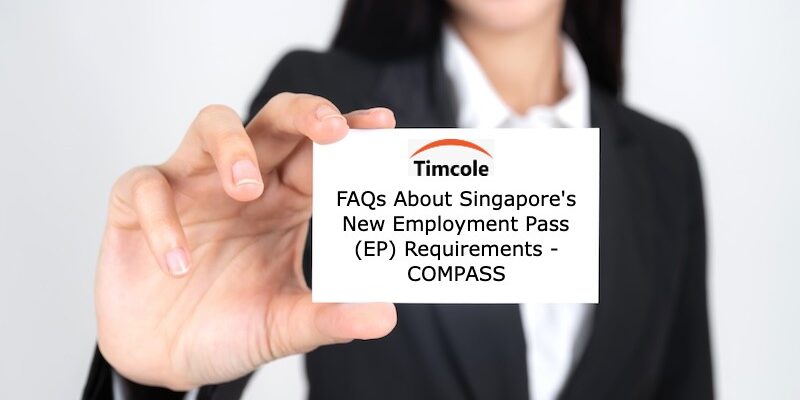Singapore, a global hub for business and innovation, has always welcomed talented individuals from around the world. In 2023, the city-state introduced significant changes to its Employment Pass (EP) requirements through the Comprehensive Program for Attracting and Retaining Skilled Specialists (COMPASS). These changes aim to bolster Singapore’s workforce with highly skilled professionals while ensuring fair opportunities for locals. To shed light on this transformative program, let’s explore some frequently asked questions (FAQs) about Singapore’s new EP requirements under COMPASS.
FAQs About COMPASS – Complementarity Assessment Framework
1. What is COMPASS, and how does it differ from previous EP regulations?
COMPASS, introduced in 2023, represents a comprehensive overhaul of Singapore’s EP framework. Unlike previous regulations, which primarily focused on salary thresholds and educational qualifications, COMPASS adopts a holistic approach to talent acquisition and retention. It considers factors such as relevant work experience, specialized skills, and potential contributions to Singapore’s economy and society.
2. What are the key changes implemented under COMPASS?
COMPASS introduces several key changes to the EP requirements, including:
- Emphasis on specialized skills and industry expertise.
- Assessment of candidates’ potential to contribute to Singapore’s strategic goals.
- Streamlined application processes to attract top-tier talent efficiently.
- Enhanced support for companies investing in workforce development and upskilling initiatives.
3. How do these changes benefit employers in Singapore?
For employers, COMPASS offers a more tailored approach to talent acquisition. By focusing on specialized skills and potential contributions, companies can attract professionals who align closely with their business objectives. Additionally, the streamlined application processes reduce administrative burdens and expedite the hiring of skilled specialists, thereby enhancing operational efficiency and competitiveness.
4. What are the eligibility criteria under COMPASS?
Under COMPASS, EP applicants are evaluated based on the following six criteria and must earn 40 points to pass:
Foundational Criteria (Each criterion allows for a maximum of 20 points)
- Criterion 1 (C1): Salary Alignment with Local PMET Norms
- Criterion 2 (C2): Qualifications Aligned with Candidate’s Profile and Firm’s Needs
- Criterion 3 (C3): Diversity Contribution to Nationality Diversity within the Firm
- Criterion 4 (C4): Support for Local Employment Relative to Industry Peers
Bonus Criteria:
- Criterion 5 (C5): Skills Bonus for Candidates Addressing Skill Shortages in Job Roles. (Allows for up to 20 points)
- Criterion 6 (C6): Strategic Economic Priorities Bonus for Collaborative Projects with Government in Investment, Innovation, Internationalization, or Company and Workforce Transformation Activities. (Allows for up to 10 points)
Employers and employment agents can utilize the upgraded Self-Assessment Tool (SAT) to verify a candidate’s eligibility before submission of an application.
5. Which occupations are part of the COMPASS Shortage List?
The Shortage Occupation List (SOL) is established through a thorough assessment process considering industry demands and local workforce enhancement endeavours. Occupations on the Shortage Occupation List (SOL) may undergo annual revisions to adapt to changing market dynamics. The next update is scheduled for March 2024, with changes becoming effective from September 2024, ensuring responsiveness to evolving conditions. Refer to the SOL Employer Guide to view the list of shortage occupations.
6. Will the minimum qualifying salary for EP applicants change under COMPASS?
While salary remains an important factor, COMPASS takes a more nuanced approach to compensation. From 1 September 2023, for all sectors except financial services, the minimum qualifying salary starts at $5,000 and increases progressively with age, reaching up to $10,500 for applicants aged 45 and above. In the financial services sector, the minimum qualifying salary begins at $5,500 and follows a similar age-dependent progression, culminating in $11,500 for applicants aged 45 and above.
Applicants who fail to meet these salary requirements will not qualify for an EP, irrespective of the points they might have accrued under COMPASS.
7. Are there any exceptions for COMPASS?
Individuals are exempt from COMPASS if they fulfil any of the following criteria:
- Have a fixed monthly salary of at least $22,500, akin to the prevailing Fair Consideration Framework (FCF) job advertising exemption from 1 September 2023.
- Are applying as an overseas intra-corporate transferee.
- Are filling the role for one month or less.
8. How can employers adapt to the changes introduced by COMPASS?
Employers can adapt to COMPASS by:
- Aligning their recruitment strategies with the program’s objectives.
- Investing in workforce development and upskilling initiatives to nurture local talent.
- Leveraging digital platforms and technology to streamline talent acquisition processes.
- Collaborating with government agencies and industry partners to stay updated on evolving regulations and best practices.
9. What are the long-term implications of COMPASS for Singapore’s economy and workforce?
COMPASS is poised to have far-reaching implications for Singapore’s economy and workforce. By attracting and retaining skilled specialists, the program strengthens key industries, drives innovation, and enhances Singapore’s global competitiveness. Moreover, COMPASS fosters a dynamic and inclusive workforce ecosystem that offers opportunities for both local and foreign talent to thrive and contribute to Singapore’s sustainable growth.
Conclusion
In conclusion, COMPASS represents a significant milestone in Singapore’s efforts to attract and retain top-tier talent. By adopting a holistic and forward-thinking approach to talent acquisition, the program positions Singapore as a preferred destination for skilled professionals seeking exciting career opportunities. With its focus on specialization, innovation, and collaboration, COMPASS sets the stage for sustained economic growth and prosperity in Singapore for years to come.
Additionally, navigating the intricacies of COMPASS and ensuring compliance with its requirements can be a complex task for businesses. This is where the role of a corporate service provider becomes invaluable. Corporate service providers specialize in managing various aspects of business administration, including human resources and immigration matters.
Engaging a corporate service provider in Singapore can assist businesses in efficiently managing their employees’ EP requirements under COMPASS. These professionals are well-versed in the latest regulations and can provide expert guidance on eligibility criteria, documentation processes, and application procedures. Their in-depth knowledge of the local landscape allows businesses to stay abreast of changes and make informed decisions in line with COMPASS requirements.








